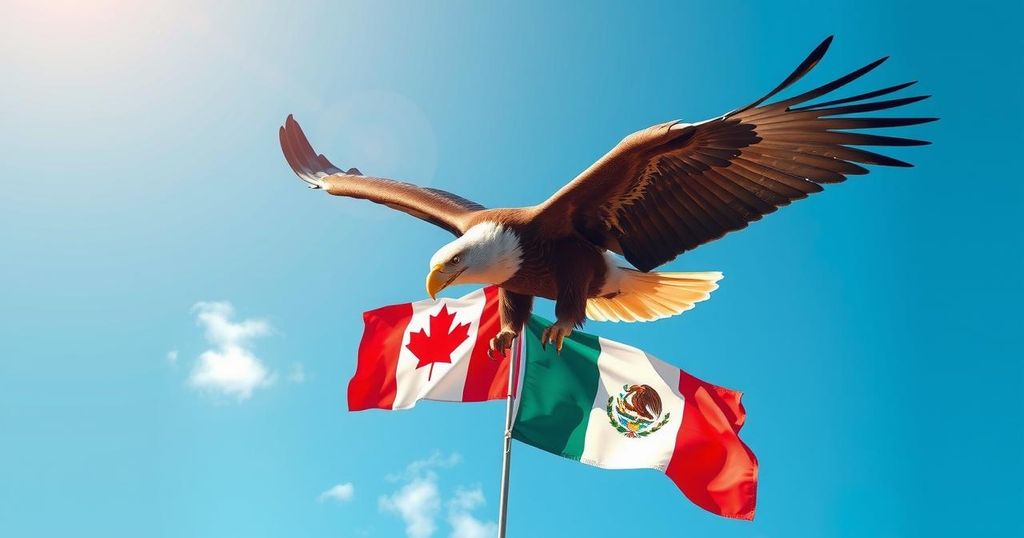World news
AFP, ASIA, BELARUS, BLOOMBERG, CANADA, CLAUDIA SHEINBAUM, CUBA, DONALD TRUMP, EUROPE, EUROPE/ASIA, HURRICANE BERYL, INDIA, LEGAL ISSUES, MARK CARNEY, MEXICO, NATIONAL SECURITY, NORTH AMERICA, NORTH KOREA, PHILIPPINES, POLITICS, RUSSIA, TREASON, TRUMP, U.S. ELECTIONS, UNITED STATES, US, WHITE HOUSE
Daniel O'Connor
0 Comments
Canada and Mexico Exempt from Trump’s April 2 Reciprocal Tariffs
On April 2, 2024, President Trump announced reciprocal tariffs; however, Canada and Mexico were exempt due to existing tariffs and agreements. Existing duties remain, and both nations will continue to navigate trade relations under the USMCA while preparing countermeasures against new tariffs.
On April 2, 2024, President Donald Trump announced significant reciprocal tariffs on several countries, declaring that the United States has been “looted, pillaged, raped, plundered” by foreign nations. Fortunately for Canada and Mexico, they were exempt from this new wave of tariffs, which started at a baseline rate of 10 percent and escalated to 45 percent on various imports.
While Canada and Mexico avoided the new tariffs, it is important to note that they are not completely unaffected. Existing tariffs remain in place, including a 25 percent duty imposed earlier this year, specifically on imports related to fentanyl, and a 10 percent tariff on Canadian energy and potash products. Additionally, new tariffs on automotive products will soon become effective.
Under the terms of the US-Mexico-Canada Agreement (USMCA), goods entering the U.S. from Canada and Mexico will continue to be exempt from the new tariffs. However, if negotiations on these levies progress, both nations could still encounter the baseline tariff rates set forth by Trump.
In reaction to the tariff announcements, Canadian Prime Minister Mark Carney emphasized that Canada would take counter-measures to protect its workforce, stating, “We are going to fight these tariffs with counter-measures. We are going to protect our workers.” Meanwhile, Mexican President Claudia Sheinbaum is expected to detail Mexico’s formal response in her upcoming press conference.
Other nations, including Russia, Cuba, Belarus, and North Korea, also remain unaffected by the tariffs as they are under existing sanctions that hinder meaningful trade relations. Trump’s broader tariffs range from 10 to 54 percent on various countries, with China facing particularly high rates due to its substantial trade surplus with the U.S.
In summary, while Canada and Mexico have successfully avoided the recent reciprocal tariffs announced by President Trump, they continue to grapple with pre-existing duties that affect their trade. The exemptions under the USMCA provide some relief, yet the potential for future negotiations remains. Both countries are poised to respond strategically to protect their economic interests moving forward, underscored by their leaders’ commitment to counter any adverse measures.
Original Source: www.hindustantimes.com




Post Comment